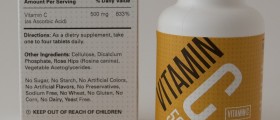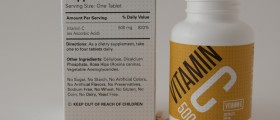
Vitamin C is a water-soluble nutrient that the human body doesn't have the ability to store. Because of this, vitamin C should be a part of your daily diet. The exact amount of vitamin C required may vary from person to person. Minimum daily requirements for vitamin C may dramatically rise when a person ages or becomes sick.
Vitamin C is certainly a popular nutrient. People all over the world take vitamin C supplements. It is estimated than more than 40% of older individuals in the United States take vitamin C supplements on a regular basis. Researches in certain regions of the country suggest that almost 25% of all adults, regardless of age, take vitamin C.
Health benefits of vitamin C
The most important benefit of vitamin C is its preventive qualities against the disease called scurvy, which is characterized by bleeding gums and skin discoloration due to ruptured blood vessels. Deficiency of vitamin C is often distinguished by poor wound healing, weak imune function and susceptibility to cold and other infections. The lining of human respiratory tract depends on vitamin C, and many respiratory infections and lung-related conditions are associated with vitamin C deficiency.
Vitamin C is essential for cellular growth and regeneration of all tissues. It is essential in formation of collagen, protein used to make skin, scar tissue, tendons, ligaments and blood vessels.
Moreover, vitamin C is a potent antioxidant that is able to block the damage caused by free-radicals and thus prevent many diseases and premature aging. Antioxidants also help reduce the damage to the body caused by toxic chemicals and pollutants such as cigarette smoke.
Food sources for vitamin C
The adequate intake levels for vitamin C are 90 milligrams for adult males and 75 milligrams for adult females. Pregnant and lactating females need slightly more vitamin C, from 80 to 120 milligrams, depending on their age.
Excellent food sources of vitamin C include broccoli, bell peppers, kale, cauliflower, strawberries, lemons, mustard and turnip greens, brussels sprouts, papaya, chard, cabbage, spinach, kiwifruit, snow peas, cantaloupe, oranges, grapefruit, limes, tomatoes, zucchini, raspberries, asparagus, celery, pineapples, lettuce, watermelon, fennel, peppermint and parsley.
Red bell peppers have the highest concentrations of vitamin C, and just one cup of them provides around 211% of recommended daily intake. However, bell peppers are usually consumed in much smaller quantities. Fresh parsley is thus probably the best natural source for vitamin C as only 2 tablespoons provide 111% of recommended daily allowance.

















Your thoughts on this
Loading...